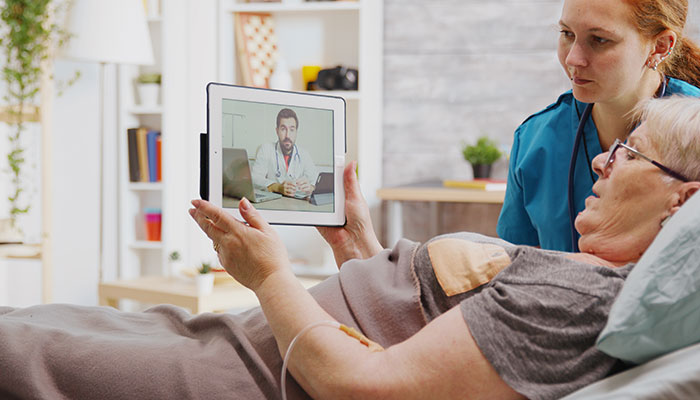Bringing the hospital home

Suppose you bring your frail loved one or a relative with dementia to the ER because of trouble breathing. The doctors determine it is pneumonia caused by bits of food being swallowed into the lungs.
Rather than stay in the hospital, they suggest your relative use the Hospital at Home (HAH) program.
With HAH, your loved one is immediately set up at home with a hospital bed, an oxygen tank, and IV antibiotics. Your relative’s blood pressure, pulse, oxygen, and temperature are then tracked remotely. A phlebotomist comes to the home several times a day to draw blood so they can monitor how the infection is going.
Nurses are assigned to visit once or twice per day. Consults with the doctor may occur via iPad. Or a doctor may come to the home if needed. A respiratory therapist comes to the home if needed. And a dietitian may visit to talk with you about foods that might be easier for your loved one to swallow.
Studies of HAH programs versus hospital stays show good results. Infections resolve more quickly. Patients with dementia have fewer experiences of confusion. There’s much less risk of COVID exposure or other hospital-acquired infections. Plus, patients get to recover while eating the food they like in the quiet of their home.
HAH programs have been popular in Europe for decades. The home setting is safer and more comfortable for elders. It’s especially used for conditions such as pneumonia, flares of heart failure or COPD, urinary tract infections, or cellulitis.
Your role Most families applaud the HAH approach. It does feel like better care. But they do acknowledge it’s tiring. The stress from 24/7 responsibility. Also, the disruption of having many different people coming into the home with little regularity in the schedule. Every day is different.
You may feel squeezed for space, dealing with the hospital bed, other equipment, and supplies. You also may be all alone as the first to realize there’s a problem if one occurs. Although nursing help is available on call 24/7, it can feel isolating and challenging. If you are working or still have kids at home, HAH may not be a good fit.
Also note that HAH is not typically available for those with original Medicare. But if your loved one is enrolled in a Medicare Advantage program, it’s worth asking if HAH is an option.
Does your relative have frequent infections?
If so, a Hospital at Home program may be the wisest approach. These programs are not stress free for family members, however. As the Metro DC experts in family caregiving, we at Aging Well Eldercare can guide and support you through the process. Give us a call at 301-593-5285.
